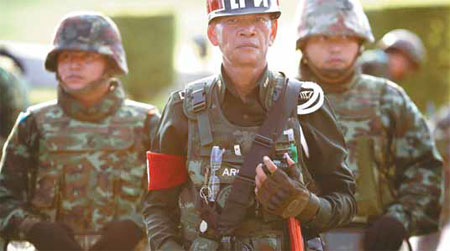Thai military junta declares coup
|
A Thai military officer leads his unit in blocking the access to the Army Club, where Thailand's army chief held a meeting with all rival factions in Bangkok on Thursday. The acting prime minister said the government wants a democratic solution. Damir Sagolj / Reuters |
Army seizes power for 12th time in 82 years to restore order
Thailand's army chief General Prayuth Chan-ocha took control of the government in a coup on Thursday, saying the army had to restore order and push through reforms, two days after he declared martial law.
Prayuth made the announcement in a television broadcast after he held a meeting with all rival factions aimed at finding a solution to six months of anti-government protests.
Prayuth said a military commission that imposed martial law two days earlier would take control of the country's administration. All national broadcasting was suspended and replaced with the commission's announcements and broadcasts of patriotic music.
Thailand's new military junta announced that it had suspended the country's Constitution.
A military statement broadcast on national television on Thursday confirmed that the nation's caretaker government was no longer in power, but it said the Senate will remain in place.
Prayuth said in the televised announcement, "In order for the situation to return to normal quickly and for society to love and be at peace again ... and to reform the structure of the political, economic and social structure, the military needs to take control of power."
The broadcast came shortly after soldiers took the leader of anti-government protests, Suthep Thaugsuban, out of the meeting that was aimed at finding a solution to a drawn-out power struggle that has polarized the country and battered its economy.
The crisis is the latest development in a long battle between supporters of ousted former prime minister Thaksin Shinawatra and opponents backed by the royalist establishment.
The army had declared martial law on Tuesday, saying the measure was necessary to prevent violence, but it rejected accusations the measure amounted to a coup.
It is the country's 12th military takeover since 1932.
Prayuth called on the two sides in a first round of talks on Wednesday to agree on a compromise that would have hinged on the appointment of an interim prime minister, political reforms and the timing of an election.
Wednesday's talks ended inconclusively, with neither side backing down from entrenched positions, participants said.
The army had let rival protesters remain on the streets but it banned them from marching, to prevent clashes. It has also clamped down on the media, including partisan television channels, and warned people not to spread inflammatory material on social media.
Leaders of the ruling Puea Thai Party and the opposition Democrat Party, the Senate leader and the five-member Election Commission had joined the second round of talks at an army base in Bangkok.
Constitution violation
Acting Prime Minister Niwatthamrong Boonsongphaisan told reporters before the talks that his government could not resign as its opponents demanded, because that would violate the Constitution.
"The government wants the problem solved in a democratic way, which includes a government that comes from elections," he said.
Government officials were not available for comment after the coup announcement.
Former telecommunications tycoon Thaksin has lived in self-exile since 2008 to avoid a jail term for graft. But he still commands the loyalty of legions of rural and urban poor and exerts a huge influence over politics, most recently through a government run by his sister, Yingluck Shinawatra.
Yingluck was forced to step down as premier by a court two weeks ago, but her caretaker government remains nominally in power, despite the declaration of martial law and six months of sometimes-violent protests aimed at ousting it.
Thailand's gross domestic product contracted 2.1 percent from January to March compared with the previous three months, largely because of the unrest, adding to fears the country is stumbling into recession.
The protesters say Thaksin is a corrupt crony capitalist who commandeered Thailand's fragile democracy, using taxpayers' money to buy votes with populist giveaways.
They wanted a "neutral" interim prime minister to oversee electoral reforms aimed at ridding the country of the Shinawatra family's political influence before any new vote.
The government and its supporters said a general election that it would likely win was the best way forward, and it had proposed polls on Aug 3, to be followed by reforms.
Reuters-AP

























